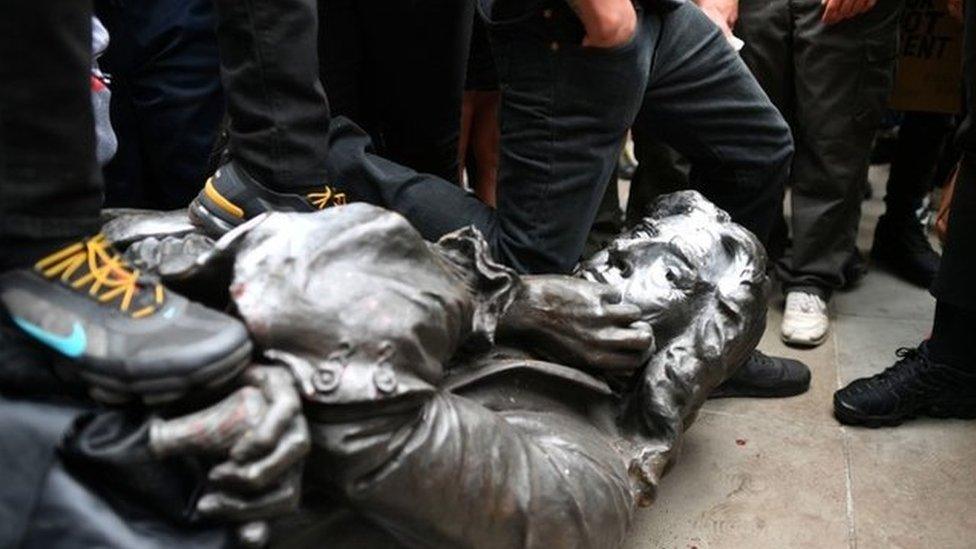Colston statue: 'We need better education and economic action'
- Published
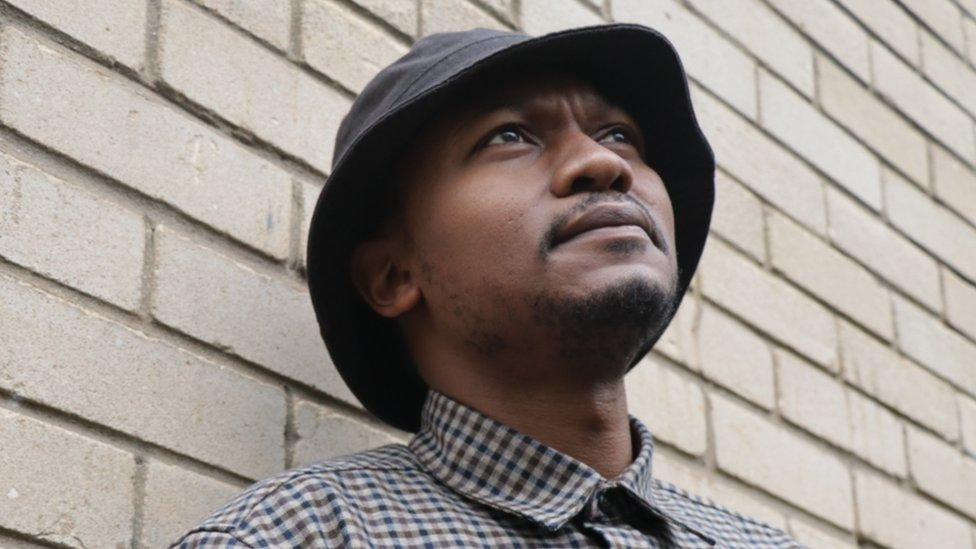
Sibusiso Tshabalala said the focus should now be on creating jobs and investing in diverse groups and businesses
Three years ago a statue of slave trader Edward Colston was pulled down by protesters as part of an anti-racism demonstration, before being dragged through the streets and thrown into Bristol harbour.
The moment on 7 June, 2020, created a global ripple effect where some historical monuments and statues were removed, and names of streets and schools related to the transatlantic slave trade questioned. There were also many opposed to the symbolic act.
The BBC has spoken to Bristolians to see how they feel now, as the plinth where the statue once stood remains empty.
Before his statue was toppled Edward Colston, a prominent 17th Century slave trader, had been a source of controversy in Bristol for many years.
Colston was a member of the Royal African Company, which transported about 80,000 men, women and children from Africa to the Americas.
On his death in 1721, he bequeathed his wealth to charities and his legacy can still be seen on Bristol's streets, memorials and buildings.
Many people said the toppling of the statue started important conversations around, equality, history and representation.
More recently though, questions have arisen about a continuous lack of positive representation within the media, education and local economies.
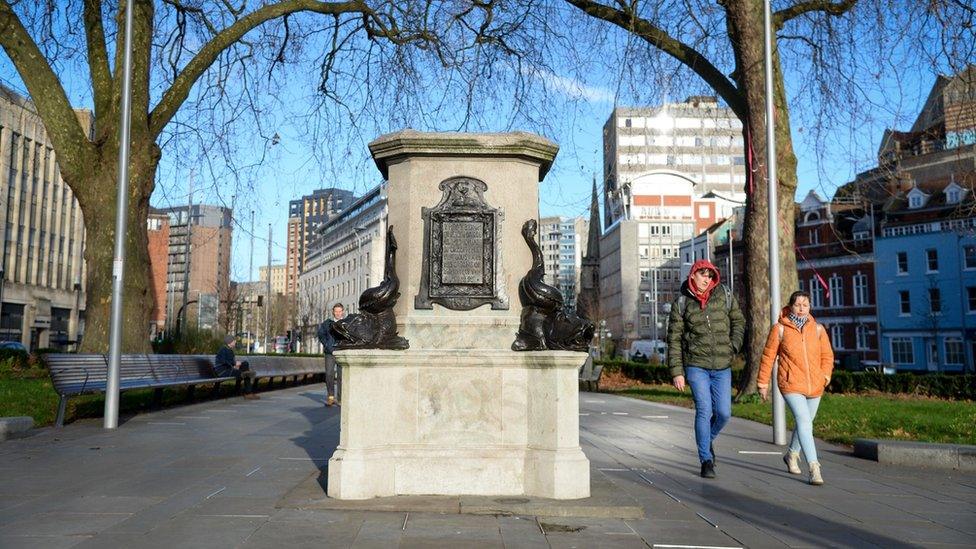
The plinth where the Colston statue once stood remains empty three years after the toppling
Bristol Black History Month (BHM) Magazine and Cognitive Paths director Sibusiso Tshabalala, said the toppling of the statue saw a shift in social justice movements but did not lead to economic investments in African, Caribbean and Asian communities.
"Are we creating jobs, opportunities and investing in diverse organisations and groups that can action the conversations that were started by the statue?," he asked.
"At the time, as the team who delivers BHM in the city, we were trying to secure funds to make it happen.
"There were crowd funders about George Floyd and people were talking about what should happen about the statue but we had to get a bounce back loan to talk about all of these things in our magazine and events.
"Similar to George Floyd, we were saying we can't breathe. There are plenty of black-led entrepreneurship and ideas without resources and funding.
"The fall of the statue is a social justice movement that needed to happen but those conversations need to lead to economic action."
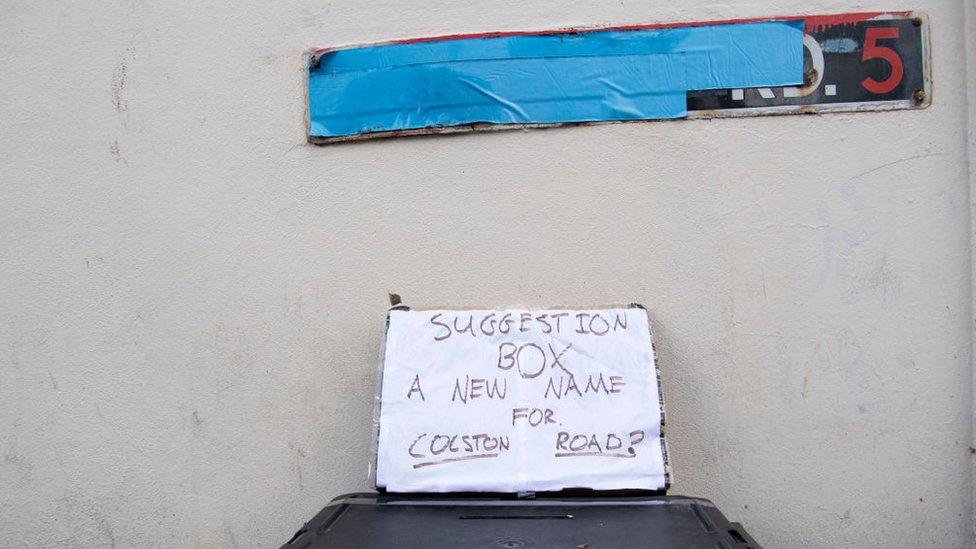
Malcolm Hamilton said conversations on changing the name of his street had polarised residents, so he has suggested using art as an alternative way to raise issues
Elsewhere in the city, there have been conversations on changing street names associated with Colston.
Currently, the city council only accepts applications to change street names if all property owners agree, with the process incurring administrative costs.
Malcolm Hamilton, who lived on Colston Road around the time the statue was pulled down, feels the process should also include rental tenants.
"I lived on Colston Road in Easton for about 15 years. The conversation about changing our street's name polarised a lot of residents and our Black and Asian residents hated the name," he said.
"A lot of residents stopped using the street name in letters and some of the road signs have now gone. Some wanted to instead create a mural or plaques at the top of the street to honour our community values."
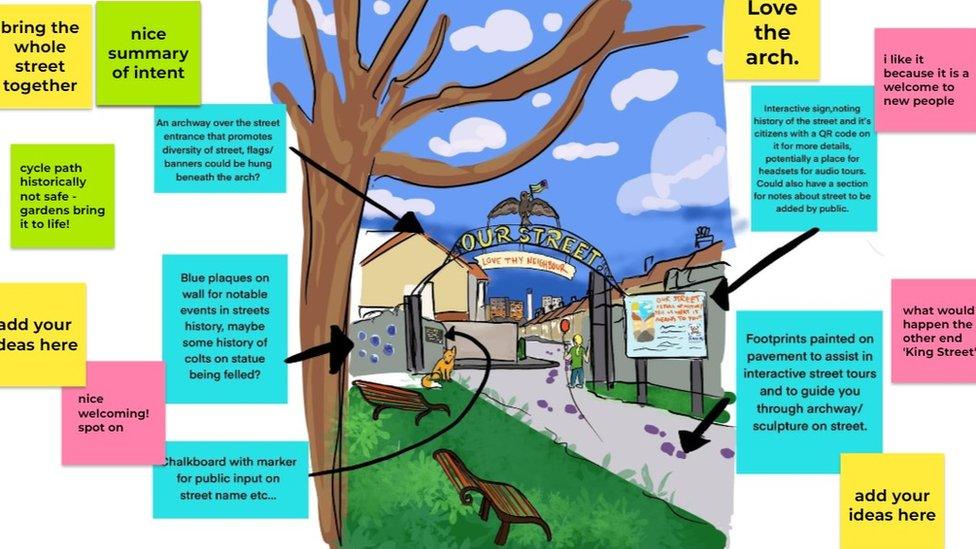
Residents on Colston Road suggested making a mural at the top of their street to celebrate the community and continue the conversation on their street's name
He said residents attempted to get the street name legally changed but could not get permission from all owners.
"It's never going to happen. It should be at least something like 70% and include renters," Mr Hamilton said.
"I think amidst these decisions, the conversation on the street's name change should be kept open and art would be the best way to do that."
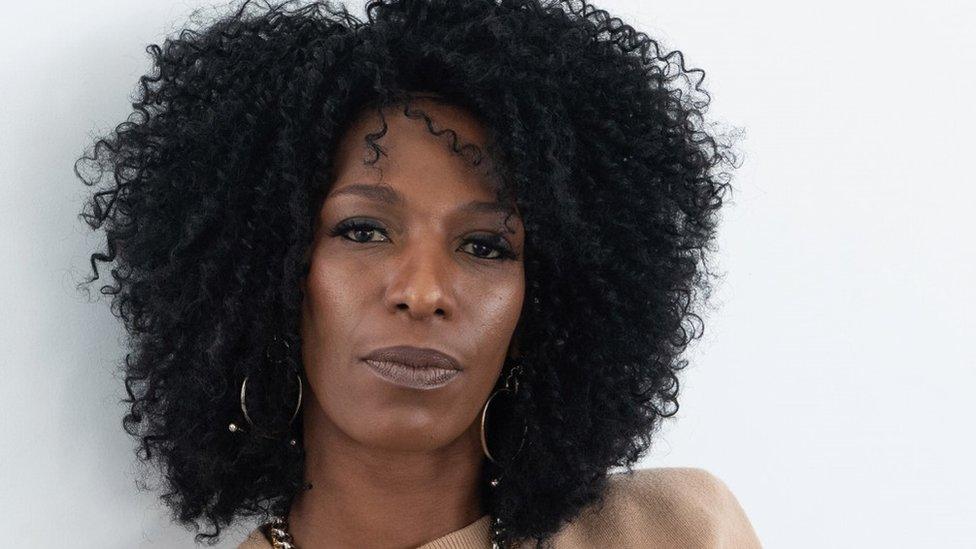
Ms Reid said there should be a focus on education and positive representation of black histories
Jen Reid, whose statue appeared on the plinth in the months after the toppling, said she now wants to visit schools to share stories of positive black role models and empower them with critical thinking skills.
"They need to question things," she said.
"Those moments sat on the carpet in school for story time are so important. Imagine if that story was about the statue.
"Three years on, we should be thinking about education now."
She said there was now an increased awareness of police brutality, social justice and racial inequality, "but more needs to be done".
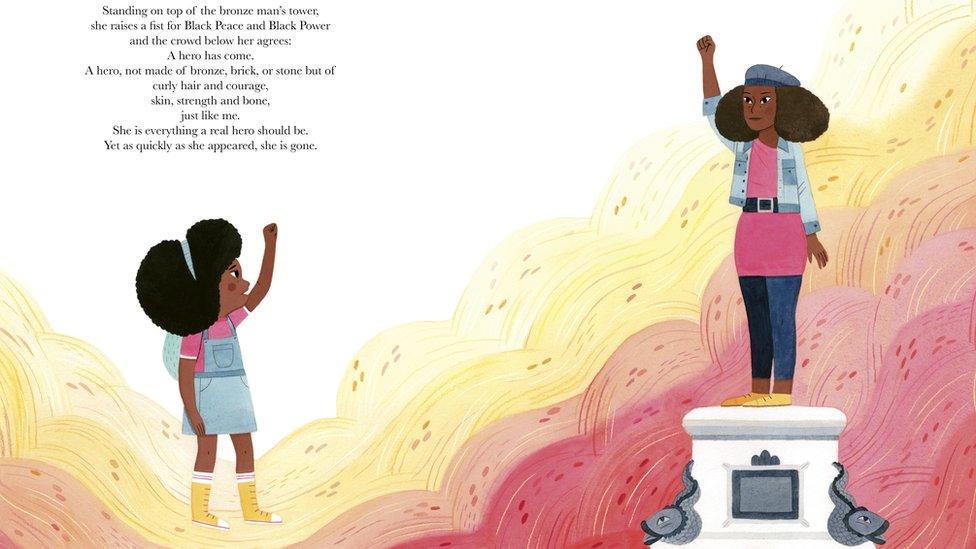
Jen Reid has produced a book she "can't wait" to share with schoolchildren
"I'm an ambassador for the CARGO Classroom series. I love the work they are doing, celebrating black historical figures and making it available for educational institutions to use," Ms Reid continued.
"We need to continue and work closely with cargo for children to have a sense of pride and celebrate their revolutionaries. We need to see representation, empowerment and pride."
Ms Reid has written a book called A Hero Like Me, that looks at the statue and its fall through the eyes of a child.
"I can't wait to sit on the carpet with children in Bristol and across the UK and read it to them," she added.

Miranda Rae said the statue should have been left at the bottom of the docks
Ujima Radio's station manager Miranda Rae said that on the third anniversary of the toppling "we should take a minute to remember why it happened - the death of George Floyd, and focus on more education on positive historical African and Caribbean people".
"I think the statue should have been left at the bottom of the river. I petitioned and protested to get the statue removed for 25 years around the time Marlon Thomas was attacked on the Downs," she said.
She said the empty plinth "says so much. So, it shouldn't be replaced".
"Since then, Ujima Radio has tweaked its Ofcom commitments to specifically celebrate African and Caribbean cultures rather than, 'BAME'," she said.
"The one thing that has changed in society is there's so many more white allies now, but there's still so much that needs to be done."

Follow BBC West on Facebook, external, Twitter, external and Instagram, external. Send your story ideas to: bristol@bbc.co.uk , external
- Published7 June 2021
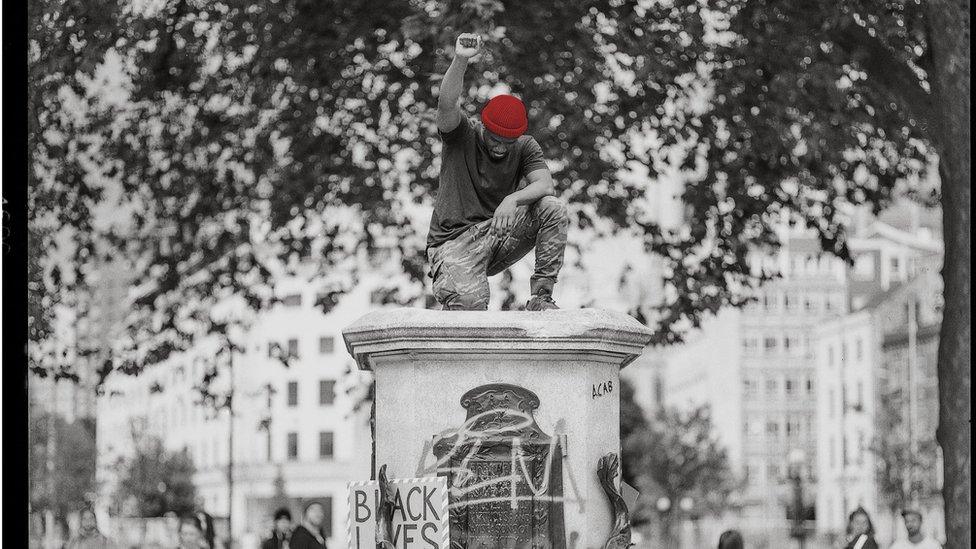
- Published15 July 2020
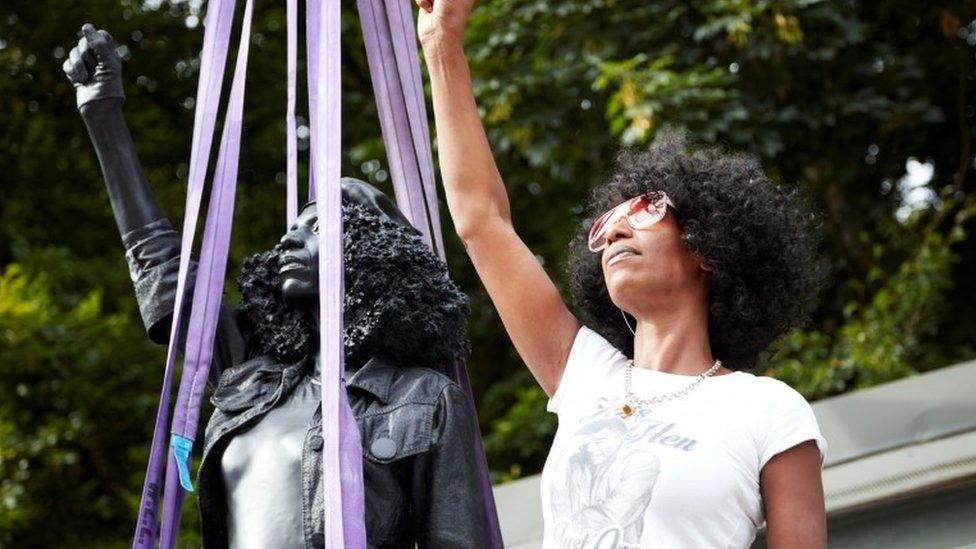
- Published7 June 2020
